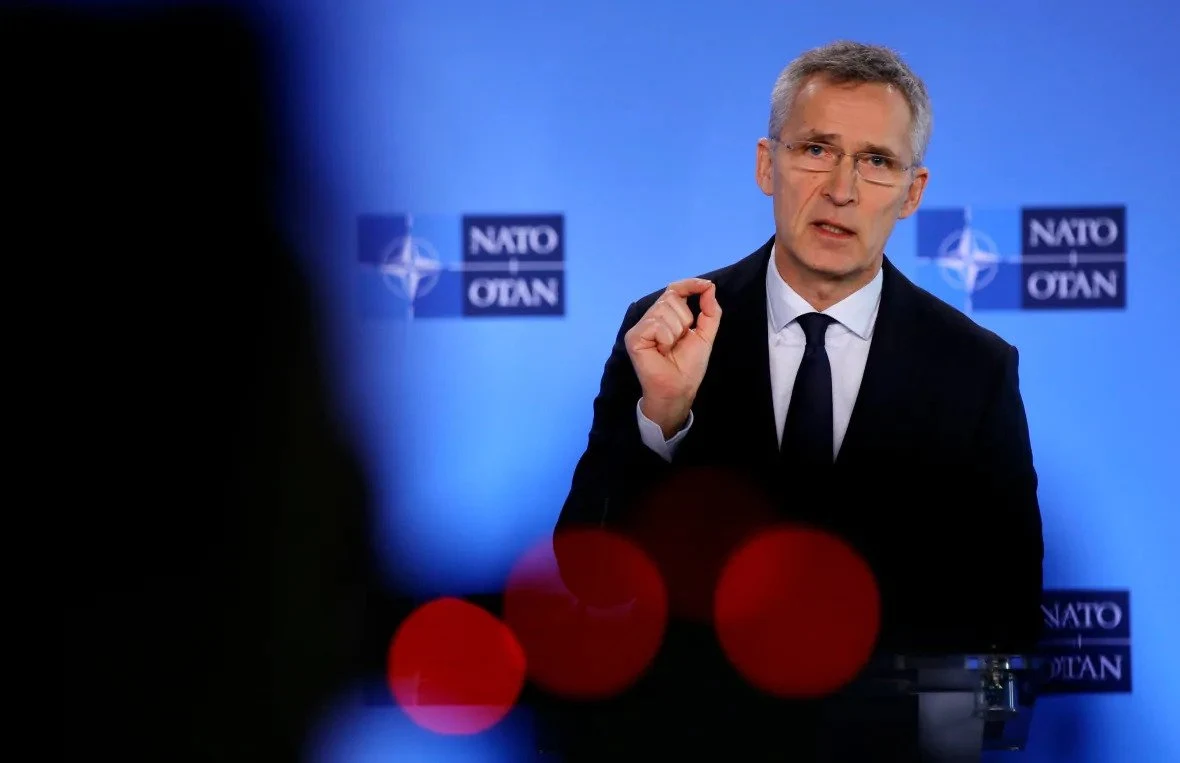Smoke rises after an airstrike in Saraqeb in Idlib province, Syria. Saraqeb has been the scene of heavy fighting, with Turkey claiming ear...
"Allies condemn the continued indiscriminate airstrikes by the Syrian regime and Russia in Idlib province," Secretary General Jens Stoltenberg said after chairing emergency talks between NATO ambassadors. "I call on them to stop their offensive, to respect international law and to back UN efforts for a peaceful solution."
"This dangerous situation must be de-escalated and we urge an immediate return to the 2018 ceasefire to avoid the worsening of the horrendous humanitarian situation in the region," Stoltenberg said.
Turkey's 28 allies also expressed their condolences over the deaths, but no additional NATO support was offered during the meeting.
Apart from providing some aerial surveillance over Syria, NATO plays no direct role in the conflict-torn country, but its members are deeply divided over Turkey's actions there, and European allies are worried about any new wave of refugees arriving. Canada said in a statement it "condemns in the strongest terms the deliberate attacks targeting civilians, schools, medical personnel and health-care facilities now occurring in Idlib, Syria.
"Canada also supports the UN secretary general's recent call for a political solution to end the humanitarian crisis currently unfolding. Only a negotiated political solution can generate a sustainable, peaceful end to the Syrian conflict."The airstrike by Syrian government forces marks the largest death toll for Turkey in a single day since it first intervened in Syria in 2016. It's a major escalation in a conflict between Turkish and Russia-backed Syrian forces that has raged since early February.
At least 54 Turkish troops have now been killed in Idlib in that time.Omer Celik, spokesperson for President Recep Tayyip Erdogan's ruling party, said Turkey was "no longer able to hold refugees" following the Syrian attack reiterating a longstanding warning from Erdogan that his country could not cope with the arrival of more people fleeing the conflict.
Greece, Bulgaria concerned about migrant flows
Turkey hosts some 3.6 million Syrians and under a 2016 deal with the European Union agreed to step up efforts to halt the flow of refugees to Europe. Since then, Erdogan has repeatedly threatened to "open the gates" in several disputes with European states.
Early Friday, broadcaster NTV showed images of dozens of people carrying rucksacks, suitcases and plastic bags, crossing fields toward the Greek frontier. Near the Pazarkule border crossing with Greece, Turkish police stopped some 150 refugees about a kilometre from the border, preventing them from going farther.
In Bulgaria, Prime Minister Boyko Borissov said that "army units, national guard and border police staff have been urgently deployed at the border with Turkey to beat off a possible migrant influx."
Borissov said that large groups of migrants were gathering by the border near the Turkish city of Edirne. But an EU spokesperson said the bloc is waiting for an official analysis on the reports of migrant movements before acting. Peter Stano said that Turkey has not officially signalled that it is changing its migrant policy. "We expect Turkey to uphold its commitments," Stano said.
Turkey's invasion of the north of the conflict-torn country along with the criticism and threats of sanctions brandished by fellow allies at Ankara over the offensive has come close to sparking a major crisis at NATO. France in particular has tried to launch debate on what Turkey's allies should do if Ankara requests their assistance under Article 5 of the Washington Treaty which requires all allies to come to the defence of another member under attack but that discussion has not happened.
The allies are extremely reluctant to be drawn into a conflict of Turkey's making.Russia on Friday said it was sending two warships armed with cruise missiles to waters off the Syrian coast and blamed Ankara for the deaths of the Turkish soldiers.
Russia's Defence Ministry was cited by the RIA news agency on Friday as saying that the Turkish troops had been hit by artillery fire from Syrian government forces who were trying to repel an offensive by rebel forces. It was quoted as saying that Ankara had failed to notify Moscow of the presence of Turkish troops in the area hit by shelling despite being in regular communication with the Russian military.
Russian war planes did not carry out any airstrikes in the area at the time of the incident and Moscow did everything it could to help once it learnt of the Turkish troop presence, the ministry was cited as saying. Meanwhile, two Russian frigates carrying cruise missiles are en route to the Syrian coast, Russian navy officials said.










